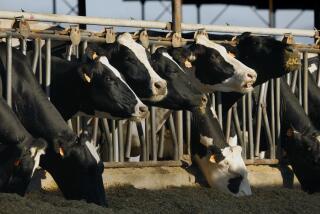‘Mad Cow’ Risk Is Tiny in U.S. Beef, Study Finds
- Share via
WASHINGTON — The U.S. Agriculture Department said Friday that a new study found little risk of “mad cow” disease turning up in American cattle, but as a precaution the government plans to test more cattle and ban the use of spinal column material in processed meat.
Harvard University researchers said in a 550-page report that the United States was “extremely unlikely” to suffer an outbreak of the deadly disease, also known as bovine spongiform encephalopathy (BSE), because of strict U.S. trade restrictions.
The disease, for which there is no known cure, destroys an animal’s brain. A human version, known as Creutzfeldt-Jakob disease, is transmitted by infected meat and has been linked to more than 100 deaths in Europe.
In the three-year study, funded by the U.S. Agriculture Department, Harvard researchers reviewed both European and U.S. animal health programs and meat processing systems to see whether the United States was vulnerable to the disease.
“As far as we know, all evidence is BSE is not in the United States,” said George Gray, Harvard’s lead researcher in the study.
“We found that even if BSE were ever introduced, it would not become established,” Gray added. “With the government programs already in place, even accounting for imperfect compliance, the disease in the cattle herd would quickly die out, and the potential for people to be exposed to infected cattle parts that could transmit the disease is very low.”
In response to the study, U.S. Agriculture Secretary Ann M. Veneman said the department next year will double the number of cattle it tests for mad cow disease to more than 12,500.
The USDA also will propose some new federal regulations to reduce potential exposure to humans.
The planned changes would ban meat processors from using bits of animal brains and spinal cord in human food and would prohibit certain stunning devices for slaughtering cattle.
More to Read
Sign up for Essential California
The most important California stories and recommendations in your inbox every morning.
You may occasionally receive promotional content from the Los Angeles Times.










